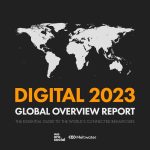By The Malketeer
The landscape of Search Engine Optimisation (SEO) is undergoing rapid transformation, fuelled by technological advancements and evolving user behaviours. In the ever-changing digital realm, staying ahead in the SEO industry is more critical than ever, given its pivotal role in the growth of online businesses.
As we head into the Dragon Year, the future of SEO is set to revolve around adapting to AI-powered search experiences and integrating conversational keywords and structured content formats. Google’s SGE (Search Global Ecosystem) is at the forefront of these developments, emphasising the need for businesses to align their strategies with the changing dynamics of user interactions with search engines.
Artificial intelligence (AI) will play a central role in shaping SEO strategies. AI-powered tools are poised to revolutionise various facets of SEO, from advanced keyword analysis to personalised user experiences. Marketers investing in AI-driven platforms can gain actionable insights, decode complex algorithms, and provide customised results based on users’ search history, location, and behavior. This personalisation allows businesses to tailor their content to specific audiences, contributing to a more engaging and relevant user experience.
Rise of Topic Clusters a Paradigm Shift in Content Creation
Long-form and original content are emerging as pillars of authority in the SEO domain. Users increasingly prefer comprehensive information presented in one place, highlighting the importance of crafting engaging narratives.
By focusing on generating content that fully addresses user inquiries, incorporating relevant keywords, and aligning with semantic search trends, businesses can not only cater to algorithms but also captivate their audience, establishing domain authority and relevance.
The rise of topic clusters marks a paradigm shift in content creation, reinforcing the importance of creating an interconnected web of information. This approach not only boosts SEO but also enhances user experience by providing a seamless journey through related topics. By infusing genuine expertise into content and creating assets that offer a broader overview of each topic cluster, businesses can establish a comprehensive and authoritative resource for users.
Pillars of SEO Trustworthiness
Semantic search and Natural Language Processing (NLP) are driving a shift towards understanding user intent. Search engines are evolving beyond traditional keyword matching, focusing on providing more relevant and accurate search results.
Answer Engine Optimisation(AEO) is a subset of SEO dedicated to creating content optimised for answer boxes on search engines, directly addressing user queries without the need for a click-through to a website.
The pillars of SEO credibility – Experience, Expertise, Authoritativeness, and Trustworthiness (E-E-A-T) – are becoming increasingly crucial. Search engines value content that aligns with these pillars, underlining the significance of establishing and maintaining a credible digital footprint.
Mobile-first SEO is no longer a choice but a necessity, given the predominance of online searches on mobile devices. Google’s mobile-first indexing prioritises mobile-optimisedwebsites, reinforcing the need for a seamless mobile experience for higher search engine rankings.
Blend of Innovation, User-Centricity, and Adaptation
Video content is gaining prominence in SEO strategies, as search engines prioritise video results and users crave dynamic, engaging content. A well-executed video strategy can enhance user engagement, dwell time, and overall website authority.
Website speed is a critical factor for user experience, with search engines considering page speed in their ranking algorithms. Fast and efficient websites not only satisfy users but also contribute to improved SEO rankings.
Building high-quality backlinks remains fundamental for SEO success, with the quality and relevance of backlinks outweighing quantity. A strategic approach to backlink building is essential for sustained SEO success.
Measuring and tracking SEO success through analytics tools is crucial for optimisation. Identifying the right keywords, tracking metrics, and staying abreast of industry trends help businesses refine their strategies and achieve better search engine rankings.
The future of SEO is a dynamic blend of innovation, user-centricity, and adaptation. With the advent of AI-powered search experiences, staying abreast of technological advancements and adapting strategies has become paramount for SEO success in 2024 and beyond.
MARKETING Magazine is not responsible for the content of external sites.











